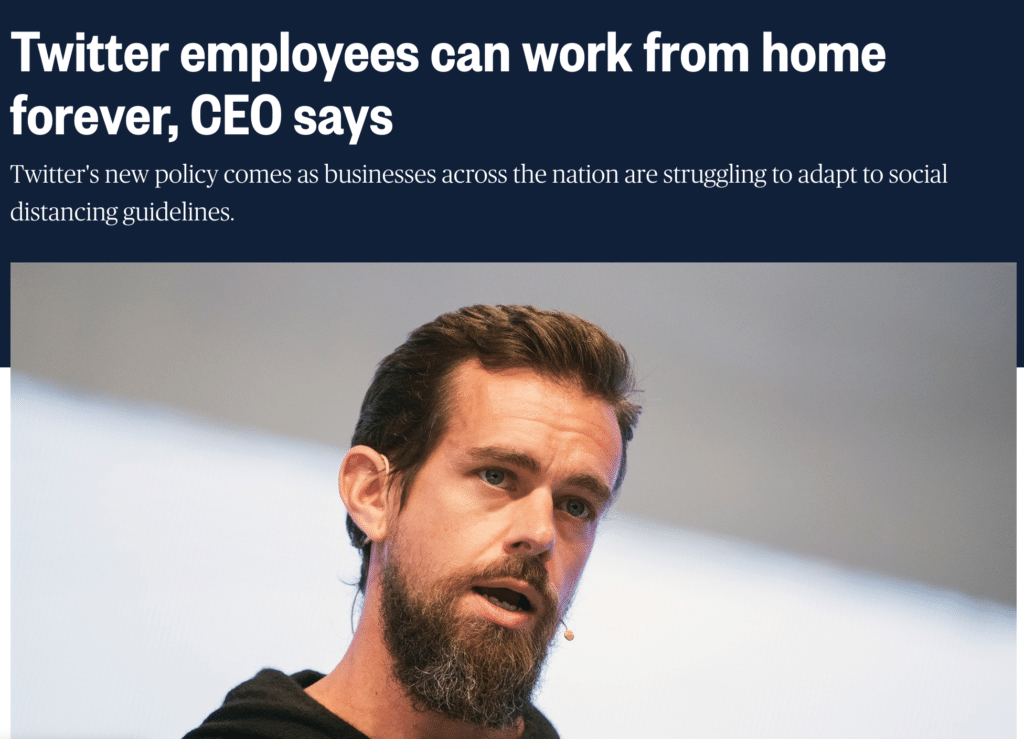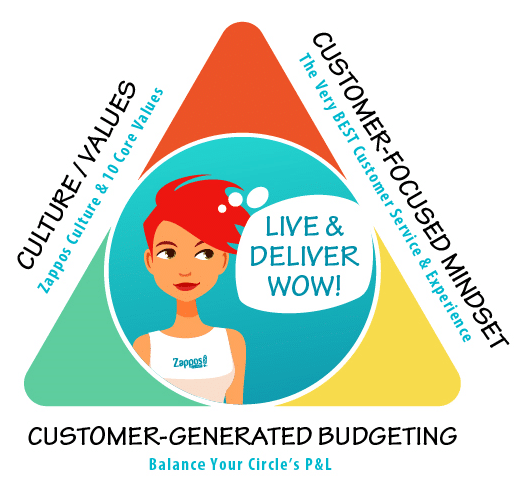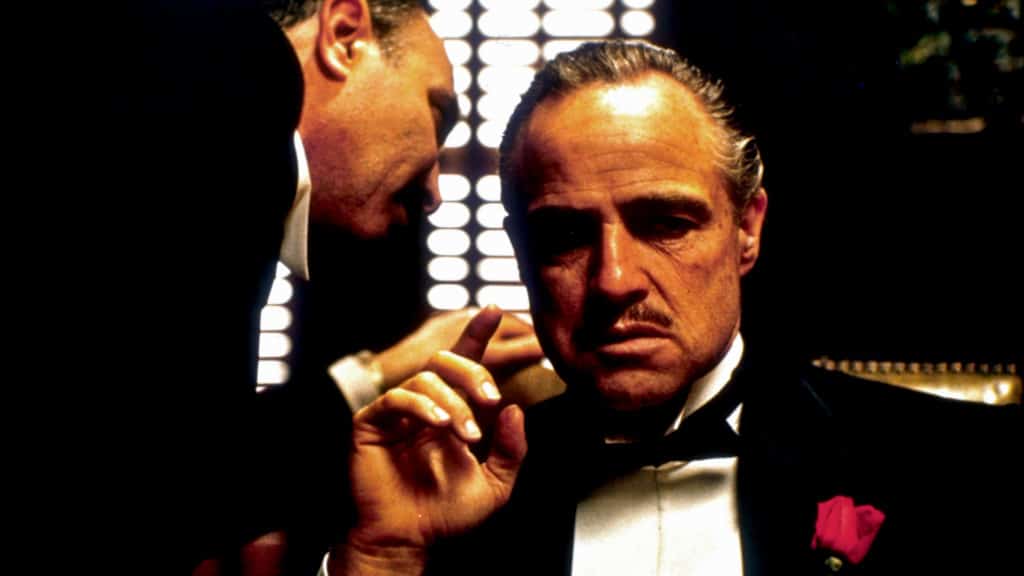

May 13, 2020
Culture of Chaos ,Great cultures
Twitter just announced they may never go back to the office:

Wow. “Forever.”
Okay, let’s just forget for second what this means for the commercial real estate market.
What does this mean for culture?
I just gave a talk for Intel on how we can lead virtually and here are a few points to consider:
You can’t get away with long, boring meetings anymore. You will lose everyone. You have to learn to get to the point quicker, get everyone on the same page, and keep people engaged.
You really think your people were productive for 8 hours a day? Try three. The good news, is we can do more in less time than we thought. But it’s going to take massive focus skills, which are dwindling away as everyone spends more and more time online with infinite distractions. You no longer have the luxury of 10 different priorities. Focus your people.
I used to spend a week at a company to determine the health of its culture. Now I just ask one question – “Do you start and end meetings on time?” Cultures that value everyone’s time equally value integrity and the culture as a whole over any one individual. Cultures where leaders are late signal that some people can break rules while others can’t. And leaders convey that they’re actually out of control when they can’t even control their own calendars. Be the example, be EARLY to everything, and notice how your respect levels go up and your stress levels go down.
December 11, 2019
Culture of Chaos ,Great cultures

Zappos sometimes feels more like a college than a company, given the friendships, the activities, and the learning. Even though I’m no longer there, I consider Zappos my alma mater of the corporate world. And part of the fun was always being part of something so relevant.
While Zappos hasn’t been the the media lately, I believe they’re about to rock the corporate culture world, again.
The Market-Based Dynamics system isn’t very public, but it’s out there.
Here’s a brief explanation:
In other words, there’s a whole Monopoly game going on inside.
Each department has a budget, and they spend it on services within the company. It’s a dynamic system where each department is serving each other in a highly accountable way, that also helps people think about how to be more efficient. So efficient that departments may go to outside service companies if there’s a better deal. There’s an entire software platform to run it.
Any department can sell its services outside the company as well. For example, the AV team (audio/video) has been contracted by Nike to shoot a commercial for them.
What’s game changing about this is that departments are incentivized to “Do More with Less” (core value #8), because if they get above their operating costs, then they can choose how to use the profits. For example, the AV team can use the profit to get new equipment, or to hire a new editor.
It’s a game. And it can be won.
Zappos has always been great about creating games, rather than “motivating” people. For example, no one gives speeches on being accountable. Why? Because in training, to win the game (get into the company), you have to show up every day at 7am for four weeks or you’re cut. People who win that game are defacto trained in being accountable.
All that said, the company has definitely not figured everything out when it comes to market based dynamics and turning cost centers to profit centers. There are a lot of open questions.
What if market based dynamics creates tense competition?
What if the internal money system does not accurately reflect the value being provided?
What if something goes wrong with those outside services that end up hurting the brand?
Disruption is risky, and courageous.
But if anyone has a history of coming out alive and creating shockwaves in the business world, it’s Zappos.
October 7, 2019
Culture of Chaos ,Great cultures ,Hacks
Of course there are many things that drive us, but when we’re talking about culture, we’re talking about relationships. There is no culture without people and it’s what’s invisible, and what’s between us that matters.
So try this on for size…
We want both safety and danger.
Think about it. We all need safety. It’s basic within the Maslow hierarchy of needs. But imagine that everything was safe, and nothing ever changed. Nothing was at risk. In a word, we’d get bored. I talked to someone at a very prestigious company that everyone wants to work for and she said there’s no challenge and she wants to find something more exciting.
And of course, if everything was a big risk then our nervous systems would be shot.
So the answer is both.
It goes back to our primary relationship with our parents. The kids who grow up with healthy relationships are those who were given safety to feel at ease, but also given the chance to expand and test our boundaries. If we were overprotected then we get soft, and anxious when anything challenges our world. If we were given no safety and supervision then it feels like we can’t rely on anyone to have our backs.
The best cultures create a sense of safety to speak our minds, and be ourselves without needing to hide. And at the same time they give us big challenges that are outside of our comfort zone so that we can grow and the company can grow as a whole.
I remember when I rode the “Saints to Sinners” bike race with the Zappos cycling team. We had an SUV with 5 guys to ride for 24 hours from Salt Lake City to Las Vegas. I remember riding through a thunderstorm and feeling safe because if anything went wrong my team was there. And I even rode in the pitch dark with only a small light in front of me. It felt scary, but I knew that my team was trailing me a few miles behind, so I was totally safe.
I had that experience at Burning Man as well. I was riding through the desert at midnight when a sand storm picked up. Very dangerous, but I felt totally safe because I had my mask, water and two friends by my side.
Remember, at its core, it’s all a feeling.
As a leader are you cultivating your own sense of balance? Do you have established systems and protocols to rely on (feel safe) while still working on the big hairy audacious goals? Both are important and maintaining both will create an engaged environment where people don’t want to leave.
March 20, 2018
Culture of Chaos ,Values

When I’m with a group of leaders and managers, there’s often one from a family business.
They are the ones who throw me a curveball. Their culture questions are very different from the rest of the group. The conversation ends pretty quickly once I give them the answer they are not expecting. I say:
It gets a ton of laughs but I’m serious.
The mafia plays by different rules, or perhaps different values. While corporations tend to be based in performance, results, and service. Family business usually means the values are loyalty and trust, before anything else.
So while that leader in the company (usually a son, brother or cousin) is trying to shift the culture, they have to play the game. They want to do things differently but what they really have to do is build up so much trust and loyalty by staying in-line.
In no other circumstance do I say this, but I say – Be a Yes Man, or a Yes Woman. Do it to the point that they get sick of it. Then they’ll either build up a ton of credit to use later, or the leaders will simply hand over more responsibility.
And the next question is – Do you want to play that game?
Because you always have a choice. You can leave and find a place that’s more in line with your values. Or if you stay, play the game and help improve it by working from within.
July 6, 2016
Culture of Chaos ,Hacks ,Productivity
When Lance Armstrong got to Europe for his first Tour de France, he quickly realized he had to either start doping or accept losing to those who did. It was a different game.
Could corporate America go the same direction? It’s possible.
Silicon Valley executives have long been known to take modafinil (brand name Provigil) to gain a cognitive edge, and it seems that Wall Street does as well. Still others create their own “custom stacks” of over the counter supplements.
These smart drugs seem to speed up the brain, and yet other workers use the effects of marijuana to focus and reduce stress.
And what about for insights and ideas? In this piece on CNN, Venture Capitalist Tim Ferriss shares that every billionaire he knows “takes psychedelics on a regular basis.”
And if we look at the offices of a smart drug supplement company, what do they do to get that extra edge? Fasting. Nootrobox‘s employees stop eating from Monday night to Wednesday morning every week. This article in Fortune explains the psychology of why fasting actually enhances our cognition.
Could performance-enhancement be the new reality of companies that outperform the others, the way doped riders took all the awards at the Tour de France?